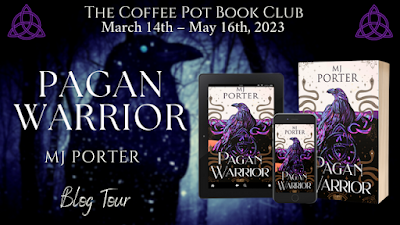From bestselling author, MJ Porter comes the tale of the mighty pagan king, Penda of Mercia.
Britain. AD632.
Penda, a warrior of immense renown, has much to prove if he is to rule the Mercian kingdom of his dead father and prevent the neighbouring king of Northumbria from claiming it.
Unexpectedly allying with the British kings, Penda races to battle the alliance of the Northumbrian king, unsure if his brother stands with him or against him as they seek battle glory for themselves, and the right to rule gained through bloody conquest.
There will be a victor and a bloody loser, and a king will rise from the ashes of the great and terrible battle of Hædfeld.
There are plenty who would love to see the Northumbrian king dead, and just as many who would love to be the one to kill him. So what happens when kings and military leaders begin to join together, and create an allied force to fight against him?
Penda is an extraordinary warrior, a man who can command armies, and either create friends or enemies with just a few words. So when Cadwallon, having been defeated by his foster brother, Edwin, King of Northumbria, finds Penda on his side, it finally seems like he will be able to exact some revenge, and remove the crown from Edwin’s hands. But as Cadwallon and Penda begin to find their alliances, Edwin is also desperately trying to find people who do not want him dead enough to be able to trust.
Tensions start to mount as people betray, switch allegiances, and try to claim titles for themselves. Brother stands against brother, kings against kings, and it will take a bloody battle before a victor can be crowned.
There are plenty of characters in this book, making way for the full ins and outs of loyalty and betrayal. A lot of family turned against each other, many of the characters in this book are related in some way or another, and yet, they still wage war on each other, and fight to be the ones to cut off each other’s heads. This book has successfully given off the sense of not knowing who is trustworthy that Edwin must’ve felt, for it is almost impossible to predict who is going to change sides, or whether someone will reveal that they have been a traitor all along. It is easy to get hooked in the social politics of the book, as people try to figure out who they would rather support, depending on how much they want revenge, or what rewards they may be awarded for choosing to show their support to a particular side.
As always, religion plays a big part in the lead-up to this battle. Plenty of the kings and lords have converted from paganism to Christianity, but there are a few who have stayed loyal to their religion, and refuse to convert. People’s religions are used against each other, especially those who are still pagan. The power of the church is definitely shown in this book, for if the priests happen to mention that something is a ‘sign’, they can give change the way the leaders are thinking, make them believe that God will guide and protect them, rather than being too concerned about planning their next moves.
I knew little going into this book about the battle of Hædfeld, I did not know who was involved, or how the battle came about. I really enjoyed learning what happened to cause so many to unite against king Edwin, and how he managed to alienate so many, including his own sons. I have read up on the history a little after reading this book, and it’s especially interesting how much is still unknown about these people, and what happened in their lives. The author must’ve spent hours upon hours researching, just to find out the smallest details. After all, we are still very much in the dark as to the ins and outs of the Dark Ages.
This book was written in a very strange way, in my opinion. Almost every chapter shows a different character’s point of view, so we not only see both sides of the battle, we see the opinions of a lot of different people. While this attempts to provide a well-rounded account of the events leading up to the battle of Hædfeld, it did make the book rather difficult to follow. There are many different names, and a backstory for each of the characters, so at times it is incredibly difficult to keep track of who is who, and whose perspective you are reading from. I found it difficult to properly get to know any of the characters, as barely any time was spent with any of them. It is certainly a unique style of writing historical fiction, and one I haven’t come across before, but unfortunately, I did not get on with it.
If you are a fan of the Dark Ages, especially in the build-up to a big battle, this is certainly the book for you. It was incredibly interesting to read, and I did enjoy learning more about people I didn’t even know had ever existed. I didn’t get on with the different perspectives each chapter, and think I would’ve enjoyed the book a lot more if it was told from just one perspective, perhaps Penda’s, but it was a great read. I would definitely read more books by this author.
MJ Porter is the author of many historical novels set predominantly in Seventh to Eleventh-Century England, as well as three twentieth-century mysteries. Being raised in the shadow of a building that was believed to house the bones of long-dead Kings of Mercia, meant that the author's writing destiny was set.





Thanks so much for hosting MJ Porter, and for your lovely, detailed review. xx
ReplyDelete